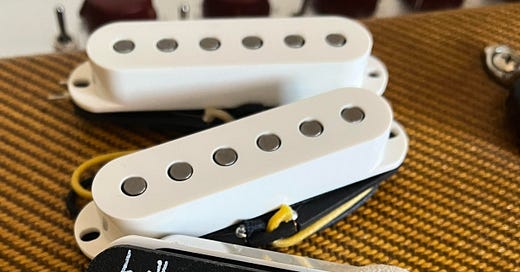When I reminisce about my favorite guitar tones, a consistent thread emerges: the captivating neck pickup of a Stratocaster. An undeniable magic in that rattly, greasy, and woody sound—a pickguard-mounted single coil in an alder body—resonates perfectly with my ears.
Indeed, when contemplating a desert island guitar, my thoughts invariably drift towards a Fender Stratocaster, or its kin—be it a PRS, Suhr, or LSL. Equip it with quality single coils, and I'm a truly content player.
Nearly a year ago, I installed a set of Fender Custom Shop Fat 60s in my Fender American Professional Gen I Stratocaster. I've been utterly enamored with that guitar ever since. Those pickups are, without a doubt, the perfect match for that particular instrument.
However, dear reader, I possess another, equally cherished Strat-style guitar that sees even more playtime: a 2011 Paul Reed Smith DC3. I've been its custodian for almost two years, and it's become a lifelong companion, boasting several features that place it ahead of my Fender. These include a preferred neck profile, a superior tremolo system, and an overall feel that simply clicks. What I didn't adore, however, were the stock pickups.
Initially, they seemed to contribute to the guitar's unique charm. But after countless hours of playing, I realized a change was necessary to truly make this guitar my own. While the PRS pickups were competent, they struck me as overly refined.
My search for replacements led me through Monty's and Bare Knuckle before an interview with the legendary George Lynch piqued my interest in Jason Lollar. Coincidentally, I had just watched Dweezil Zappa's video about his new Shabatt guitar. Influenced by my heroes? Absolutely.
Unlike my well-defined preferences for hot-rodded PAF-style humbuckers, I approached Strat-style single coils with a relatively blank slate. My primary requirement? A neck position that evoked the elusive Eric Johnson tone.
While I'm under no illusions that I sound like Eric (or that anyone else can), I've now had two consecutive successful experiences with 1960s-inspired Stratocaster pickup sets.
And yes, I'm thoroughly impressed. The Lollar Sixty-Four set, designed after pre-CBS Fender Stratocaster pickups, delivers a delightful midrange and a remarkably clear, piano-like quality. These pickups are incredibly responsive, revealing every nuance of your playing, for better or worse. The top end is notably less brittle than that of the Fender Custom Shop Fat ‘60s.
I'd argue that the Lollar Sixty-Four pickups possess a richer, fuller sound than their Fender counterparts. But this set has another ace up its sleeve: the inclusion of a Jason Lollar Special S bridge pickup.
Lollar markets this set as one of their most popular and versatile offerings, and I wholeheartedly concur. It seamlessly handles my blues-rock and bluesy-jazz explorations through both a Dumble ODS clone and my trusty Marshall Silver Jubilee. The fun truly begins when I incorporate my Fractal FM3, utilizing a Landau-esque, 80s session player patch.
While the quest for the perfect Strat-style bridge pickup continues, I'm finding immense satisfaction in the Special S with the tone rolled back to around 6 or 7.
Although wound hotter than the Sixty-Four pickups, the Special S bridge pickup is also warmer and more substantial, making it an excellent companion. Admittedly, I spend relatively little time solely on the bridge pickup of a Strat-style guitar, but the position 2 combination with the middle pickup yields almost faux lap steel tones.
A part of me wishes I had a few more Strat-style guitars on hand to conduct a comprehensive shootout of Lollar's entire product line, but I feel like I've struck gold with this set.
Even with a touch of overdrive from a Providence SOV-2, I'm immersed in pure, bluesy bliss. This overwhelmingly positive experience has ignited a desire to explore a set of Imperial humbuckers in my PRS CE24.
So, who are these pickups for? This is one of the rare instances where a piece of gear truly caters to everyone. They enhance your existing tone rather than drastically altering your guitar's character. The last time I experienced such profound satisfaction with a set of pickups was during my initial foray into single coils back in 2019.
In conclusion, if you're seeking single-coil pickups that prioritize classic, vintage-inspired tones over modern, high-output sounds, look no further than Jason Lollar.
To paraphrase Luther Dickinson, 'If you're not hip to Lollar, get hip!' Or, as my trusted guitar tech succinctly put it, 'Lollars?! Nice!'"




